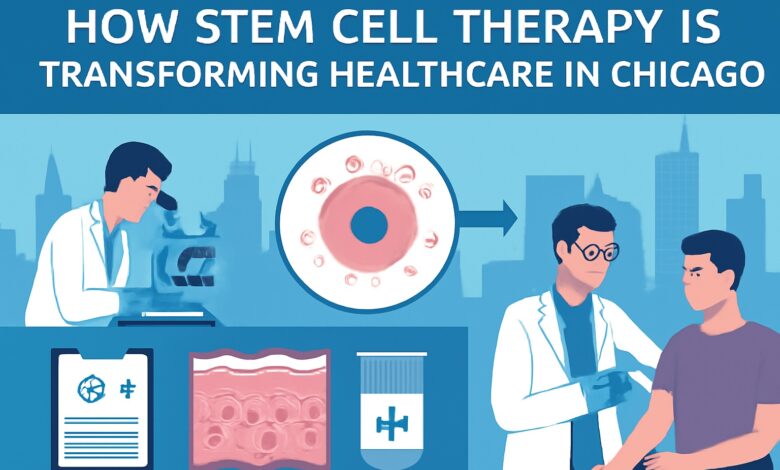How Stem Cell Therapy is Transforming Healthcare in Chicago

In recent years, stem cell therapy has emerged as a groundbreaking medical treatment with the potential to revolutionize the healthcare industry. The ability of stem cells to regenerate damaged tissues, promote healing, and treat a wide array of ailments has caught the attention of researchers, doctors, and patients alike. In Chicago, a hub of medical innovation, stem cell therapy is making significant strides in enhancing patient outcomes, especially in areas such as orthopedics, chronic pain management, and autoimmune diseases. With new advances in science and technology, stem cell therapy is transforming the healthcare landscape, offering hope and healing to many individuals who have struggled with conventional treatments.
Stem cell therapy has the potential to significantly reduce the need for invasive surgeries and long-term use of medications. By harnessing the natural regenerative properties of stem cells, doctors can promote healing within the body without the need for harsh interventions. This approach has proven to be effective in treating a variety of conditions, including joint pain, osteoarthritis, and degenerative diseases. Additionally, stem cell treatments are being used to help patients recover from injuries more quickly, thereby improving their quality of life and reducing their reliance on pain management strategies such as opioids.
The versatility of stem cell therapy is one of its most remarkable qualities. Unlike traditional treatments, which often address the symptoms of a condition, stem cell therapy aims to treat the underlying cause of the problem. By promoting the regeneration of damaged tissues and stimulating the body’s natural healing processes, stem cells offer a more holistic approach to medicine. This is particularly beneficial for individuals with chronic conditions, where traditional treatments often offer limited relief.
Stem cell therapy Chicago has become a key area of focus in the city’s healthcare system. With a large number of hospitals, research institutions, and specialized medical centers, Chicago has become a leading center for stem cell research and treatment. Medical professionals in the city have been at the forefront of developing innovative treatments that utilize stem cells to address conditions ranging from sports injuries to degenerative diseases like Parkinson’s disease. As a result, many patients are now seeking out stem cell therapy as an alternative to more conventional treatments, eager to explore the promising possibilities offered by this groundbreaking medical field.
One of the most exciting aspects of stem cell therapy is its potential to improve the lives of people suffering from chronic pain. Chronic pain conditions, such as those caused by arthritis or previous injuries, often result in long-term suffering and a reduced quality of life. Traditional pain management treatments, such as medications or surgeries, can offer only temporary relief and may carry risks of side effects or complications. Stem cell therapy, however, addresses the root cause of the pain by encouraging the body’s natural healing process. For many patients, this has resulted in significant pain relief, improved mobility, and a return to normal activities without the need for invasive procedures or long-term medication use.
For those dealing with joint pain or osteoarthritis, stem cell therapy offers an exciting alternative to traditional treatments like joint replacement surgery. In some cases, stem cell injections into the affected joints can stimulate the regeneration of cartilage, reduce inflammation, and promote healing. This approach has been shown to delay or even eliminate the need for joint replacement surgery, allowing patients to preserve their natural joint function and maintain an active lifestyle. The non-invasive nature of stem cell treatments also means that patients experience less downtime and a quicker recovery compared to traditional surgical procedures.
Another area where stem cell therapy is showing great promise is in the treatment of autoimmune diseases. Conditions like rheumatoid arthritis, lupus, and multiple sclerosis, which occur when the body’s immune system attacks its own tissues, can be difficult to treat using conventional methods. Traditional treatments often involve suppressing the immune system, which can lead to various side effects. Stem cell therapy offers a more targeted approach by encouraging the regeneration of damaged tissues and modulating the immune system’s response. In some cases, patients have experienced significant improvements in their symptoms, leading to a better quality of life and reduced reliance on medication.
Stem cell therapy is also gaining attention for its potential in treating neurological disorders such as Alzheimer’s disease, Parkinson’s disease, and spinal cord injuries. These conditions, which involve the degeneration of nerve cells, have traditionally been challenging to treat effectively. However, recent advancements in stem cell research have shown that stem cells may have the ability to repair or replace damaged nerve cells, offering hope to patients with these debilitating conditions. While research in this area is still ongoing, early results are promising, and many medical professionals are excited about the potential for stem cell therapy to make a real difference in the lives of people with neurological disorders.
In addition to its regenerative capabilities, stem cell therapy is also being explored for its potential in cosmetic and aesthetic treatments. Stem cells are known to promote tissue regeneration and healing, which makes them an attractive option for individuals seeking to improve their skin’s appearance or reduce the signs of aging. Procedures like stem cell facelifts, which use stem cells to regenerate skin tissue and promote collagen production, have become increasingly popular in Chicago and other major cities. These non-surgical treatments offer patients a more natural and minimally invasive way to enhance their appearance without the risks and downtime associated with traditional cosmetic surgery.
While the potential benefits of stem cell therapy are undeniable, it is important to note that the field is still relatively new, and research is ongoing. As with any medical treatment, there are risks involved, and not all patients may be suitable candidates for stem cell therapy. It is essential for individuals considering stem cell treatments to consult with qualified healthcare providers who specialize in regenerative medicine. A thorough evaluation, including a review of medical history and specific needs, is necessary to determine whether stem cell therapy is the right option for each patient.
The future of stem cell therapy in Chicago and beyond looks incredibly promising. As research continues and new breakthroughs are made, the range of conditions that can be treated with stem cells is likely to expand. Stem cell therapy holds the potential to transform not only the way we approach treatment for chronic conditions but also the overall approach to healthcare itself. By focusing on the body’s innate ability to heal and regenerate, stem cell therapy offers a more personalized, holistic approach to medicine that could help patients lead healthier, more active lives.
As medical professionals continue to refine and expand their understanding of stem cell therapy, it is likely that the use of stem cells will become more widespread, offering patients more treatment options and greater hope for healing. Whether for orthopedic issues, autoimmune diseases, or neurological conditions, stem cell therapy is rapidly emerging as a powerful tool in the fight against a variety of health challenges.
In conclusion, stem cell therapy is transforming the healthcare landscape in Chicago, offering patients new hope for healing and recovery. By harnessing the regenerative power of stem cells, doctors can help patients recover from injuries, manage chronic pain, and treat a variety of conditions that were previously difficult to address. As the field continues to evolve, stem cell therapy will likely become an even more integral part of modern healthcare, improving outcomes and enhancing the quality of life for countless individuals.
For more information on adult stem cell therapy and its potential benefits, visit https://www.ultimatemedgroup.com/adult-stem-cell-therapy/.


